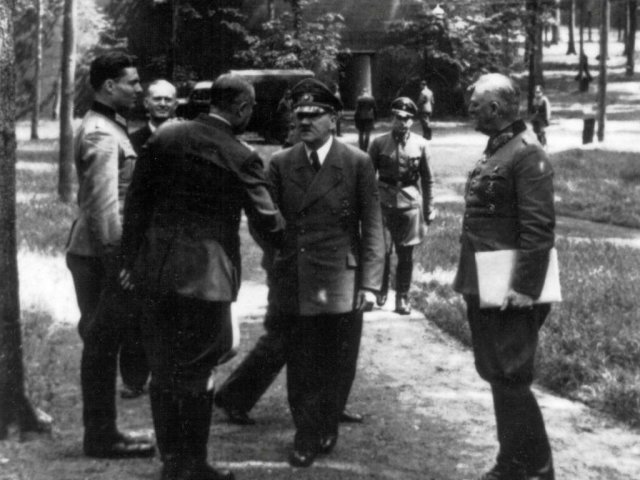Stauffenberg (l.) with Hitler in front of the “Führerbunker”
Photo: Archive
Eight decades of bipolar interpretation: July 20, 1944, the failed assassination attempt on Hitler in Wolf’s Lair in occupied Poland 80 years ago, was an instrument for politically expedient instrumentalization for decades. A broad alliance of predominantly noble Wehrmacht officers and civilians from various political camps had conspired in great secrecy to attempt tyrannicide as a last resort to avert Germany’s final catastrophe. At this point, the war had long been lost for the Nazis, many German cities were in ruins, millions of soldiers and civilians were dead, and there would be no more senseless victims for Hitler’s plans for world domination.
In her book, published in time for the anniversary, the journalist Ruth Hoffmann, born in 1973, retells the history and failure of the coup attempt, which was intended as a liberation strike, and its eventful reception history in divided post-war Germany. Her presentation follows scientific standards and becomes a critical German history of the last 80 years. “The German Alibi” was the title of Ruth Hoffmann’s presentation. It summarizes old and familiar things and, in its treatment of July 20th, reflects the almost arbitrary interpretability of historical facts. Whoever has the power also has the authority to interpret historical events. Ultimately, however, the truth prevails.
Hitler and his murderous accomplices, career-obsessed military officers and lawyers as well as fanatical propagandists, swore bloody revenge on the assassins and their co-conspirators and sympathizers. Claus Schenk Graf von Stauffenberg and his closest comrades-in-arms were the first to die, shot shortly after their arrest in the courtyard of the Bendler Block, the seat of the Wehrmacht High Command and the scene of the dramatic events of that memorable day. Today the German Resistance Memorial Center is located in the building complex on Berlin’s Stauffenbergstrasse, which belongs to the Federal Ministry of Defense.
The Nazi vilification of the assassins lived on in postwar West Germany. They had broken the oath they had sworn to the “Fuhrer” and betrayed their country. For years they were defamed and surviving family members were ostracized and compensation payments were denied, while the murder judges collected big pensions. In a sensational criminal case that was initiated in Braunschweig by the Hessian public prosecutor Fritz Bauer, who later became famous for the Auschwitz trial in Frankfurt am Main, it was established in court for the first time that “the Third Reich was never a constitutional state.” The German-Jewish lawyer, who was imprisoned the year Hitler came to power and emigrated in 1936, had insisted that it was the task and duty of the public prosecutor’s office and the judges of a democratic constitutional state to rehabilitate “the heroes of July 20th without reservation.” This is what happened in the verdict: “An unjust state is not capable of treason.”
In the meantime, however, rearmament took place in Adenauer’s Republic. The Cold War was in full swing. Obedience and oath loyalty were again among the basic soldier virtues. The military intervened on July 20th. Nevertheless, mainly due to pressure from abroad, they were now officially celebrated as witnesses to the “better Germany”. In contrast to social democrats and communists, who had resisted from the beginning and were the first to disappear en masse into the concentration camps and were murdered, as Ruth Hoffmann complains. In this context, the author points to the attackers’ efforts to have the broadest possible base and emphasizes that they had no fear of contact with allies from the labor movement. Especially not the “Kreisau Circle”, which the author goes into in depth. There were even contacts with the “Red Orchestra,” which was defamed in the Federal Republic for decades as a spy organization controlled by Moscow.
The politics of remembrance ignored facts that were not acceptable. The “Heroes of July 20th” became an alibi that the Germans were not actually Nazis. They were celebrated every year on the anniversary of the assassination attempt. The consensus about the “presentability” of the Hitler assassins as forerunners and role models for West German democracy extends to the AfD, writes Ruth Hoffmann. However, your statement that it was the Bochum historian Hans Mommsen who first clarified the political lives of the assassins, who welcomed the rise of Hitler and National Socialism early on and by no means anchored democratic principles in the plans for the time after a successful assassination attempt, is once again from a West German perspective owed. The fact is, however, that the judgment of the military-noble conspirators in the Federal Republic changed again and they were seen as supporters and supports of the regime, especially among young students.
The official celebrations remained, with the swearing-in of recruits taking place alternately in the courtyard of the Bendler Block and in front of the Reichstag. The speeches given on such occasions caused many a scandal; Some scheduled speakers, such as Herbert Wehner, opted out of appearing, but the former, bloodstained Nazi naval judge Filbinger did not.
Ruth Hoffmann also goes on trips to the GDR, where the assassins were honored, but also viewed very critically. They represented a basic national-conservative attitude, were by no means exemplary democrats and for a long time had a positive attitude towards the Nazi ideology and the Nazi goals. According to Ruth Hoffmann, her transformation and her willingness to sacrifice her life to put an end to the dictator’s activities, which were recognized as criminal, are all the more important. Late, very late, they turned into heroes.
Ruth Hoffmann: The German alibi. Myth “Stauffenberg assassination” – How July 20th is glorified and politically exploited. Goldmann, 400 p., hardcover, €24.
Subscribe to the “nd”
Being left is complicated.
We keep track!
With our digital promotional subscription you can read all issues of »nd« digitally (nd.App or nd.Epaper) for little money at home or on the go.
Subscribe now!
